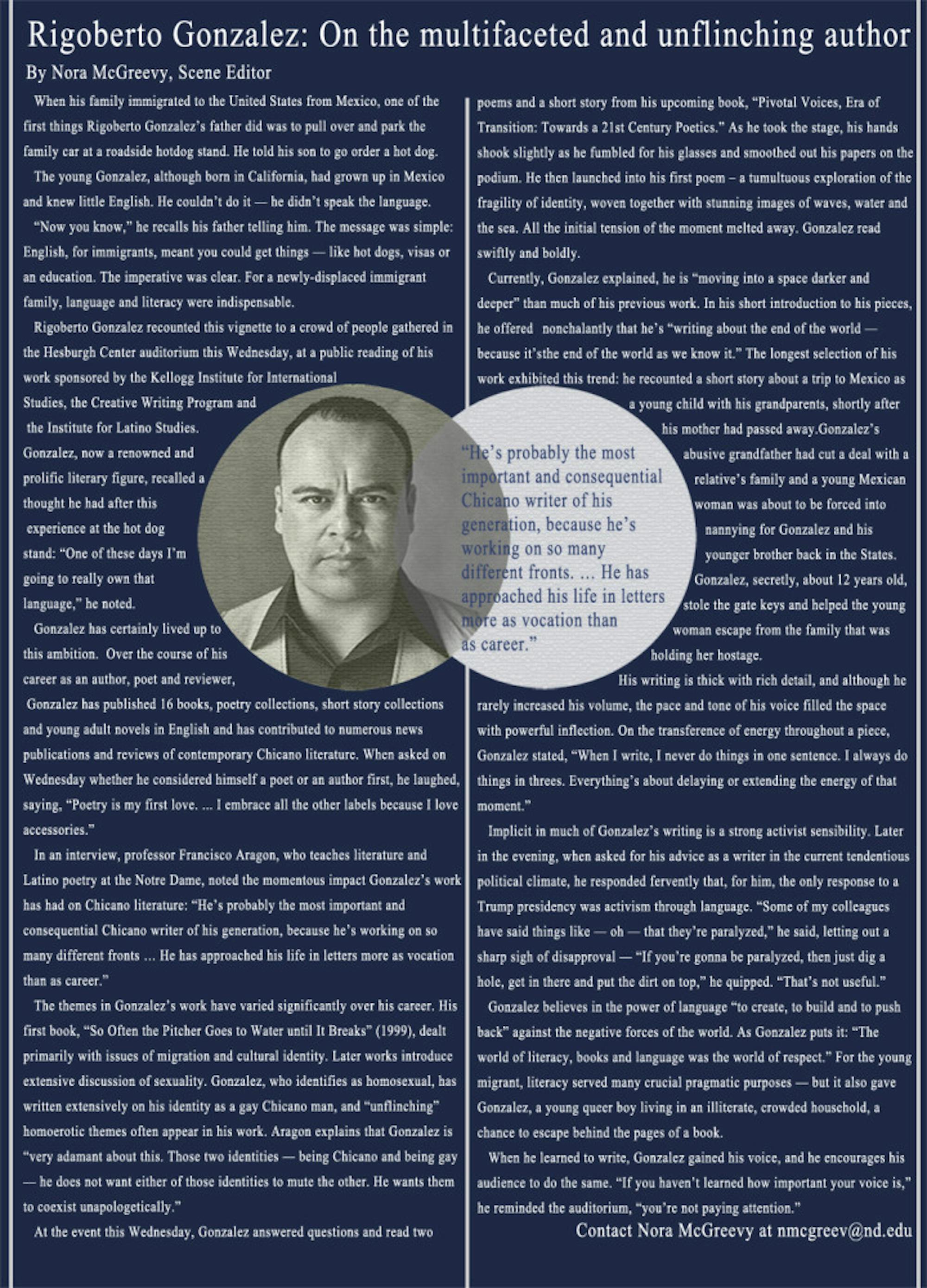
When his family immigrated to the United States from Mexico, one of the first things Rigoberto Gonzalez’s father did was to pull over and park the family car at a roadside hotdog stand. He told his son to go order a hot dog.
The young Gonzalez, although born in California, had grown up in Mexico and knew little English. He couldn’t do it — he didn’t speak the language.
“Now you know,” he recalls his father telling him. The message was simple: English, for immigrants, meant you could get things — like hot dogs, visas or an education. The imperative was clear. For a newly-displaced immigrant family, language and literacy were indispensable.
Rigoberto Gonzalez recounted this vignette to a crowd of people gathered in the Hesburgh Center auditorium this Wednesday, at a public reading of his work sponsored by the Kellogg Institute for International Studies, the Creative Writing Program and the Institute for Latino Studies. Gonzalez, now a renowned and prolific literary figure, recalled a thought he had after this experience at the hot dog stand: “One of these days I’m going to really own that language,” he noted.
Gonzalez has certainly lived up to this ambition. Over the course of his career as an author, poet and reviewer, Gonzalez has published 16 books, poetry collections, short story collections and young adult novels in English and has contributed to numerous news publications and reviews of contemporary Chicano literature. When asked on Wednesday whether he considered himself a poet or an author first, he laughed, saying, “Poetry is my first love ... I embrace all the other labels because I love accessories.”
In an interview, professor Francisco Aragon, who teaches literature and Latino poetry at the Notre Dame, noted the momentous impact Gonzalez’s work has had on Chicano literature: “He’s probably the most important and consequential Chicano writer of his generation, because he’s working on so many different fronts … He has approached his life in letters more as vocation than as career.”
The themes in Gonzalez’s work have varied significantly over his career. His first book, “So Often the Pitcher Goes to Water until It Breaks” (1999), dealt primarily with issues of migration and cultural identity. Later works introduce extensive discussion of sexuality. Gonzalez, who identifies as homosexual, has written extensively on his identity as a gay Chicano man, and “unflinching” homoerotic themes often appear in his work. Aragon explains that Gonzalez is “very adamant about this. Those two identities — being Chicano and being gay — he does not want either of those identities to mute the other. He wants them to coexist unapologetically.”
At the event this Wednesday, Gonzalez answered questions and read two poems and a short story from his upcoming book, “Pivotal Voices, Era of Transition: Towards a 21st Century Poetics.” As he took the stage, his hands shook slightly as he fumbled for his glasses and smoothed out his papers on the podium. He then launched into his first poem – a tumultuous exploration of the fragility of identity, woven together with stunning images of waves, water and the sea. All the initial tension of the moment melted away. Gonzalez read swiftly and boldly.
Currently, Gonzalez explained, he is “moving into a space darker and deeper” than much of his previous work. In his short introduction to his pieces, he offered nonchalantly that he’s “writing about the end of the world — because it’s the end of the world as we know it.” The longest selection of his work exhibited this trend: he recounted a short story about a trip to Mexico as a young child with his grandparents, shortly after his mother had passed away. Gonzalez’s abusive grandfather had cut a deal with a relative’s family, and a young Mexican woman was about to be forced into nannying for Gonzalez and his younger brother back in the States. Gonzalez, secretly, at about 12 years old, stole the gate keys and helped the young woman escape from the family that was holding her hostage.
His writing is thick with rich detail, and although he rarely increased his volume, the pace and tone of his voice filled the space with powerful inflection. On the transference of energy throughout a piece, Gonzalez stated, “When I write, I never do things in one sentence. I always do things in threes. Everything’s about delaying or extending the energy of that moment.”
Implicit in much of Gonzalez’s writing is a strong activist sensibility. Later in the evening, when asked for his advice as a writer in the current tendentious political climate, he responded fervently that, for him, the only response to a Trump presidency was activism through language. “Some of my colleagues have said things like — oh — that they’re paralyzed,” he said, letting out a sharp sigh of disapproval — “If you’re gonna be paralyzed, then just dig a hole, get in there and put the dirt on top,” he quipped. “That’s not useful.”
Gonzalez believes in the power of language “to create, to build and to push back” against the negative forces of the world. As Gonzalez puts it: “The world of literacy, books and language was the world of respect.” For the young migrant, literacy served many crucial pragmatic purposes — but it also gave Gonzalez, a young queer boy living in an illiterate, crowded household, a chance to escape behind the pages of a book.
When he learned to write, Gonzalez gained his voice, and he encourages his audience to do the same. “If you haven’t learned how important your voice is,” he reminded the auditorium, “you’re not paying attention.”













